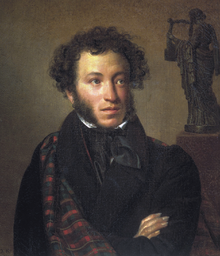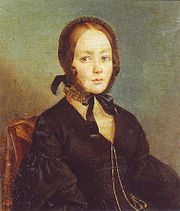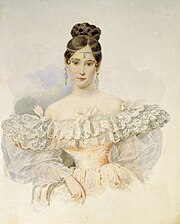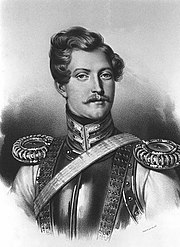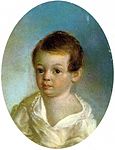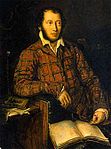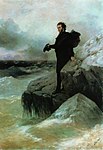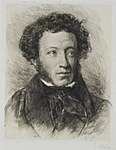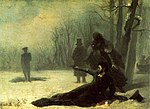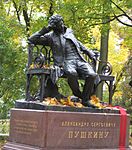ألكسندر بوشكين
Alexander Pushkin
| ألكسندر بوشكين | |
|---|---|
| (بالروسية: Александр Сергеевич Пушкин)، و(بالروسية: Александръ Сергѣевичъ Пушкинъ) | |
|
|
|
| معلومات شخصية | |
| اسم الولادة | (بالروسية: Александр Сергеевич Пушкин) |
| الميلاد | 6 يونيو 1799 موسكو |
| الوفاة | 1837 سانت بطرسبرغ |
| سبب الوفاة | إصابة بعيار ناري |
|---|---|
| الإقامة | موسكو (6 سبتمبر 1833–10 سبتمبر 1833) |
نيجني نوفغورود
قازان (–20 سبتمبر 1833)
أوليانوفسك
أوليانوفسك (22 سبتمبر 1833–24 سبتمبر 1833)
لايشيفو
أوليانوفسك
أورينبورغ (30 سبتمبر 1833–)
ساراتوف
بينزا
بولشوي بولدينو، نيزنيج نوفغورود (13 أكتوبر 1833–)
سانت بطرسبرغ
موسكو (–24 أكتوبر 1829)
سانت بطرسبرغ
|
كيشيناو (1820–1823) سيمفروبول (1820–1820) أوديسا (1823–1824) |
|
| الجنسية | |
|---|---|
| الحياة العملية | |
| الاسم الأدبي | ألكسندر بوشكين |
| المواضيع | علم التاريخ، والدراماتورج، وترجمة، والنقد |
| الحركة الأدبية | رومانسية |
| المدرسة الأم | فناء تسارسكوي سيلو (1811–1 يونيو 1817) |
| المهنة | شاعر، كاتب روائي ومسرحي |
| اللغة الأم | الروسية |
| اللغات | الروسية |
| مجال العمل | علم التاريخ، والدراماتورج، وترجمة، والنقد |
| أعمال بارزة | يفغيني اونيغين، وابنة الضابط، ومجلة الرسالة/العدد 826/القصص |
| تأثر بـ | جون كيتس، وفولتير، ودانتي أليغييري، ويوهان غوته، وفريدريك شيلر، ووليم شكسبير، وجورج غوردون بايرون، وبيرسي بيش شيلي |
| التيار | رومانسية |
| التوقيع | |
| المواقع | |
| IMDB | صفحته على IMDB |
ألكسندر سيرغيجيفتش بوشكين ( 6 يونيو 1799 – 10 فبراير 1837) شاعر روسي، وكاتب مسرحي، وروائي في الحقبة الرومانسية، يُعتبر من قبل الكثير الشاعر الروسي الأعظم ومؤسس الأدب الروسي الحديث.
وُلد بوشكين لعائلةٍ روسية نبيلة في موسكو. ينتمي والده سيرغي لفوفيتش بوشكين إلى عائلات بوشكين النبيلة. كان مسقط رأس جده الأكبر من نسب والدته الفريق الأول (الجنرال) أبرام بيتروفيتش جانيبال في أفريقيا. نشر أول قصيدة له في سن الخامسة عشرة، وعُرف بشكل واسع من قبل المؤسسات الأدبية في وقت تخرجه من فناء تسارسكوي سيلو (قاعة ألكسندر الإمبراطورية). ألقى بوشكين خلال تخرجه من المدرسة الثانوية قصيدته المثيرة للجدل «أغنية الحرية»، التي تُعد واحدة من عدة قصائد أدت لنفيه من قبل الإمبراطور ألكسندر الأول. كتب بوشكين مسرحيته الدرامية الأكثر شهرةً «بوريس غودونوف» في ظل المراقبة المشددة من قبل شرطة الإمبراطور السياسية وعدم القدرة على النشر. كانت روايته الشعرية «يفغني أونيغين» تُنشر بشكل متسلسل خلال عام 1825 حتى عام 1832.
جُرح بوشكين بشكل مميت في مبارزة مع نسيبه «جورج تشارلز دي هيكران دانثيس» الذي يُعرف أيضًا باسم دانتي جيكيرن، وهو ضابط فرنسي يخدم فوج الحرس الخيالة، حاول إغواء زوجة الشاعر ناتاليا بوشكينا.
الحياة الباكرة
وُلد في موسكو، عُهد ببوشكين إلى الممرضات والمعلمين الفرنسيين، وتحدث الفرنسية في معظم الوقت حتى سن العاشرة. أصبح ملمًا باللغة الروسية من خلال تواصله مع أقنان المنزل ومربيته، آرينا روديونوفا، التي أحبها بشدة وتعلق بها أكثر من تعلقه بوالدته. نشر قصيدته الأولى في سن الخامسة عشرة. كانت موهبته معروفة بشكل واسع في الوسط الأدبي الأوروبي عندما أنهى تعليمه المدرسي، كجزء من فصل التخرج من مدرسة القاعة الإمبراطورية في تسارسكوي سيلو، بالقرب من سانت بطرسبرغ. انغمس بوشكين بعد المدرسة بثقافة الشباب الفكرية الصاخبة والنابضة بالحياة في العاصمة سانت بطرسبرغ. نشر قصيدته الأولى الطويلة في عام 1820 «رسلان ولودميلا» التي أثارت جدلًا كبيرًا حول موضوعها وأسلوبها.
الإرث
الأدبي
يصنف النقاد أعماله على أنها أعمال فنية مميزة، مثل قصيدة «الفارس البرونزي» والمسرحية الدرامية «الضيف الحجري»، قصة سقوط دون خوان. كانت مسرحيته الشعرية القصيرة «موزارت وساليري» (مثل «الضيف الحجري»، إحدى المجموعات الأربع «التراجيديات الصغيرة» التي جُسدت من قبل بوشكين نفسه في رسالة إلى بيوتر بلتينوف في عام 1830) بمثابة إلهام لمسرحية بيتر شافير «أماديوس» وأوبرا ريمسكي كورساكوف «موزارت وساليري». عُرف بوشكين أيضًا بقصصه القصيرة. وبشكل خاص مجموعة «حكايات الراحل إيفان بتروفش بيلكين»، بما فيها «الطلقة» التي لاقت رواجًا جيدًا. فضل بوشيكن بنفسه روايته الشعرية «يفغني أونيغين»، التي كتبها خلال مسيرة حياته والتي أصبحت تقليدًا خاصًا بالروايات الروسية العظيمة، إذ تتبع بضع شخصيات محورية لكنها تختلف بشكل واسع في النبرة والتركيز.كانت رواية أونيغين معقدة لدرجة جعلت المترجم فلايديمر نابوكوف يحتاج لمجلدين كاملين من المحتوى من أجل تقديم معناها بشكل كامل باللغة الإنجليزية، على الرغم من أنها كانت عبارة عن مئة صفحة تقريبًا فقط. وبسبب تلك الصعوبة في الترجمة بقي شعر بوشيكن غير معروف بشكل كبير بالنسبة لقراء اللغة الإنجليزية. وعلى الرغم من ذلك، ألهم بوشكين عددًا كبير من الكتاب الغربيين مثل هنري جيمس. كتب بوشكين «ملكة البستوني» التي أدرجت في «بلاك ووتر»، وهي مجموعة من القصص القصيرة حول طبيعة أغلبية الكتّاب الرائعة، والتي جمعها ألبرتو مانغيل.
الموسيقي
كانت أعمال بوشكين بمثابة الأرض الخصبة بالنسبة للملحنين الروسيين. إذ كانت أوبرا غلينكا «رسلان ولودميلا» أولى أعمال الأوبرا الهامة التي استُلهمت من أعمال بوشكين، وتركت أثرًا في التقاليد الموسيقية الروسية. أصبحت أعمال تشايكوفسكي الأوبرالية «يفغني أونيغن» و«ملكة البستوني» لربما أكثر شهرةً خارج روسيا من أعمال بوشكين التي حملت الاسم ذاته.
تصنف أوبرا موسورسكي التذكارية «بوريس غودونوف» كأحد أروع أعمال الأوبرا الروسية وأكثرها أصالة. ومن الأعمال الأوبرالية التي اعتمدت على أعمال بوشكين أوبرا دارغوميسكي «رسالكا» وأوبرا «الضيف الحجري»؛ وأوبرا ريمسكي كورساكوف «موزارت وساليري»، وأوبرا «قصة القيصر سلطان»، وأوبرا «الديك الصغير الذهبي»؛ وأوبرا كوي «سجين القوقاز» وأوبرا «وليمة في زمن الطاعون» وأوبرا «ابنة القبطان»؛ وأوبر تشايكوفسكي «مازيبا»؛ وأوبرا رخمانينوف ذات العرض الواحد «أليكو» (اعتمادًا على «الغجريات») وأوبرا «الفارس البخيل»؛ وأوبرا سترافينسكي «مارفا»، وأوبرا نابرافنيك «دبروفسكي».
بالإضافة لاعتماد رقصات الباليه والكنتاتا، والأغاني التي لا تحصى، على قصائد بوشكين الشعرية (بما فيها قصائده باللغة الفرنسية، في سلسلة أغاني إيزابيل أبولكير «ترويكا»). وأيضًا اعتمدت أوبرا كل من سوبّ، وليونكافالو، ومالبييرو على أعماله.
حُولت «رغبة المجد»، التي كُرست لإليزافيتا فوروتسوفا، إلى موسيقى من قبل ديفيد توخمانوف (فيتولد بيتروفسكي – رغبة المجد في اليوتيوب)، وكذلك «احفظ لي، طلسمي» من قبل ألكسندر باريكين (ألكسندر باريكين – احفظ لي طلسمي في اليوتيوب) ولاحقًا من قبل توخمانوف.
الرومانسية
يصنف بوشكين من قبل الكثيرين على أنه الممثل المركزي للرومانسية في الأدب الروسي على الرغم من أنه لم يُعرف بكونه رومانسيًا. جادل النقاد الروسيون تقليديًا أن أعماله تمثل طريقًا من الكلاسيكية الحديثة إلى الواقعية من خلال الرومانسية. تقترح التقييمات البديلة أنه «امتلك القدرة على تقبل التناقضات التي قد تبدو رومانسية في الأصل، لكنها تهدم بشكل كبير كافة وجهات النظر الثابتة، وكافة التوقعات المنفردة، بما فيها الرومانسية» و«هو رومانسي وغير رومانسي في الوقت ذاته».
اللغة الروسية
وفقًا لفلاديمير نابوكوف، جمعت تعابير بوشكين الاصطلاحية كافة العناصر الروسية المعاصرة مع كل ما تعلمه من ديرزهافين وجوكوفسكي وباتيوشكوف وكرامزين وكريلوف:
- نقطة رقم واحد: النزعة الشعرية والميتافيزيقية التي لا زالت حية في صيغ وتعابير السلافونية الكنسية.
- نقطة رقم اثنان: الغاليسِسم (الألفاظ الفرنسية الدخيلة) الوفيرة والطبيعية.
- نقطة رقم ثلاثة: اللغة العامية (الدارجة) من مجموعته الخاصة.
- نقطة رقم أربعة: الخطاب الشعبي المنمق عبر صنع خليط من الأساليب الثلاثة الشهيرة (المنخفضة، ومتوسطة الارتفاع، والمرتفعة)
القريبة من الألفاظ الكلاسيكية المقلدة المهجورة مع إضافة مكونات من الرومانسية الروسية والقليل من المحاكاة الساخرة. يعود الفضل عادةً إلى بوشكين في تطور الأدب الروسي. إذ يُرى أنه أنشأ المستوى الفارق بدقة من اللغة الذي مثل الأدب الروسي من بعده، ويُعاد الفضل إليه أيضًا في زيادة المعجم الروسي بشكل كبير. وأبدع ترجمات اقتراضية كلما وجد فجوات في المفردات الروسية. كانت موسوعة مفرداته الغنية وأسلوبه عالي الحساسية تأسيسًا للأدب الروسي المعاصر. سجلت إنجازاته رقمًا جديدًا في تطور اللغة والثقافة الروسية. أصبح مؤسس الأدب الروسي في القرن التاسع عشر، من خلال إنجازاته العظيمة في القرن الثامن عشر وبداية العملية الأدبية للقرن التاسع عشر. إذ قدم روسيا لكافة أنماط الأدب الأوروبي بالإضافة لعدد كبير من كتاب أوروبا الغربية. جلب الخطاب الطبيعي والتأثيرات الأجنبية ليصنع روسيا الشعرية العصرية. وعلى الرغم من قصر فترة حياته، ترك أمثلة لكل نمط أدبي تقريبًا في زمنه: الشعر الغنائي، والشعر القصصي، والرواية، والقصة القصيرة، والمسرح الدرامي، والمقالة النقدية وحتى الرسالة الشخصية.
مؤلفاته
- روسلان ولودميلا (1820)
- أسير القفقاس (1822)
- نافورة باختشي سراي (1823)
- الغجر (1824)
- بوريس غدونوف (1825)
- قصيدته الوطنية الملحمية بولتافا (1828)
- التراجيديات الصغيرة (1830)
- بيت في كولومنا (1830)
- قصص بيلكين (1831)
- يفغيني اونيغين (1825-1832)
- ملكة البستوني (1833)
- دوبروفسكي (1833)
- الفارس النحاسي (1833)
- ابنة الآمر (1836)
- زنجي بطرس الأكبر (1837)
- ــــــــــــــــــــــــــــــــــــــــــــــــــــــــــــ
-
Alexander Pushkin
Jump to navigation Jump to search
Alexander PushkinAlexander Pushkin by Orest KiprenskyNative name Александръ Сергѣевичъ ПушкинъBorn Aleksandr Sergeyevich Pushkin
26 May 1799
Moscow, Russian EmpireDied 29 January 1837 (aged 37)
Saint Petersburg, Russian EmpireOccupation Poet, novelist, playwright Language Russian, French Nationality Russian Alma mater Tsarskoye Selo Lyceum Period Golden Age of Russian Poetry Genre Novel, novel in verse, poem, drama, short story, fairytale Literary movement Romanticism
RealismNotable works Eugene Onegin, The Captain’s Daughter, Boris Godunov, Ruslan and Ludmila Spouse Natalia Pushkina (m. 1831)Children Maria, Alexander Fremke, Grigory, Natalia Relatives Sergei Lvovich Pushkin, Nadezhda Ossipovna Gannibal
Signature 
Alexander Sergeyevich Pushkin (English: /ˈpʊʃkɪn/;[1] Russian: Александр Сергеевич Пушкин[note 1], tr. Aleksandr Sergejevich Pushkin, IPA: [ɐlʲɪkˈsandr sʲɪrˈɡʲe(j)ɪvʲɪtɕ ˈpuʂkʲɪn] (
 listen); 6 June [O.S. 26 May] 1799 – 10 February [O.S. 29 January] 1837) was a Russian poet, playwright, and novelist of the Romantic era[2] who is considered by many to be the greatest Russian poet[3][4][5][6] and the founder of modern Russian literature.[7][8]
listen); 6 June [O.S. 26 May] 1799 – 10 February [O.S. 29 January] 1837) was a Russian poet, playwright, and novelist of the Romantic era[2] who is considered by many to be the greatest Russian poet[3][4][5][6] and the founder of modern Russian literature.[7][8]Pushkin[9] was born into Russian nobility in Moscow. His father, Sergey Lvovich Pushkin, belonged to Pushkin noble families. His maternal great-grandfather was African-born general Abram Petrovich Gannibal. He published his first poem at the age of 15, and was widely recognized by the literary establishment by the time of his graduation from the Tsarskoye Selo Lyceum. Upon graduation from the Lycee, Pushkin recited his controversial poem “Ode to Liberty“, one of several that led to his exile by Tsar Alexander I of Russia. While under the strict surveillance of the Tsar’s political police and unable to publish, Pushkin wrote his most famous play, the drama Boris Godunov. His novel in verse, Eugene Onegin, was serialized between 1825 and 1832.
Pushkin was fatally wounded in a duel with his brother-in-law, Georges-Charles de Heeckeren d’Anthès, also known as Dantes-Gekkern, a French officer serving with the Chevalier Guard Regiment, who attempted to seduce the poet’s wife, Natalia Pushkina.
Ancestry
Pushkin’s father, Sergei Lvovich Pushkin (1767–1848), was descended from a distinguished family of the Russian nobility that traced its ancestry back to the 12th century.[10]
Pushkin’s mother, Nadezhda (Nadya) Ossipovna Gannibal (1775–1836), was descended through her paternal grandmother from German and Scandinavian nobility.[11][12] She was the daughter of Ossip Abramovich Gannibal (1744–1807) and his wife, Maria Alekseyevna Pushkina (1745–1818).
His father Major S. L. PushkinOssip Abramovich Gannibal’s father, Pushkin’s great-grandfather, was Abram Petrovich Gannibal (1696–1781), an African page kidnapped to Constantinople as a gift to the Ottoman Sultan and later transferred to Russia as a gift for Peter the Great. Abram wrote in a letter to Empress Elizabeth, Peter the Great’s daughter, that Gannibal was from the town of “Lagon”. Largely on the basis of a mythical biography by Gannibal’s son-in-law Rotkirkh, some historians concluded from this that Gannibal was born in a part of what was then the Abyssinian Empire, located today in Eritrea.[13] Vladimir Nabokov, when researching Eugene Onegin, cast serious doubt on this origin theory. Later research by the scholars Dieudonné Gnammankou and Hugh Barnes eventually conclusively established that Gannibal was instead born in Central Africa, in an area bordering Lake Chad in modern-day Cameroon.[13][14] After education in France as a military engineer, Gannibal became governor of Reval and eventually Général en Chef (the third most senior army rank) in charge of the building of sea forts and canals in Russia.
His mother Nadezhda GannibalovaPushkin exam at lyceumEarly life
This section does not cite any sources. (December 2019) (Learn how and when to remove this template message)Born in Moscow, Pushkin was entrusted to nursemaids and French tutors, and spoke mostly French until the age of ten. He became acquainted with the Russian language through communication with household serfs and his nanny, Arina Rodionovna, whom he loved dearly and was more attached to than to his own mother. He published his first poem at 15. When he finished school, as part of the first graduating class of the prestigious Imperial Lyceum in Tsarskoye Selo, near Saint Petersburg, his talent was already widely recognized on the Russian literary scene. After school, Pushkin plunged into the vibrant and raucous intellectual youth culture of the capital, Saint Petersburg. In 1820, he published his first long poem, Ruslan and Ludmila, with much controversy about its subject and style.
Social activism
While at the Lyceum, Pushkin was heavily influenced by the Kantian liberal individualist teachings of Alexander Petrovich Kunitsyn, whom Pushkin would later commemorate in his poem 19 October.[15] Pushkin also immersed himself in the thought of the French Enlightenment, to which he would remain permanently indebted throughout his life, particularly Diderot and Voltaire, whom he described as “the first to follow the new road, and to bring the lamp of philosophy into the dark archives of history”.[16][17]
Pushkin gradually became committed to social reform and emerged as a spokesman for literary radicals. That angered the government and led to his transfer from the capital in May 1820.[18] He went to the Caucasus and to Crimea and then to Kamianka and Chișinău in Moldavia, where he became a Freemason.
Pushkin’s married lover Anna Petrovna Kern, for whom he probably wrote the most famous love poem in RussianHe joined the Filiki Eteria, a secret organization whose purpose was to overthrow Ottoman rule in Greece and establish an independent Greek state. He was inspired by the Greek Revolution and when the war against the Ottoman Turks broke out, he kept a diary recording the events of the national uprising.
Rise
He stayed in Chișinău until 1823 and wrote two Romantic poems, which brought him acclaim: The Captive of the Caucasus and The Fountain of Bakhchisaray. In 1823, Pushkin moved to Odessa, where he again clashed with the government, which sent him into exile on his mother’s rural estate of Mikhailovskoye (near Pskov) from 1824 to 1826.[19]
In Mikhaylovskoye, Pushkin wrote nostalgic love poems which he dedicated to Elizaveta Vorontsova, wife of Malorossia‘s General-Governor.[20] Then Pushkin continued work on his verse-novel Eugene Onegin.
In Mikhaylovskoye, in 1825, Pushkin wrote the poem To***. It is generally believed that he dedicated this poem to Anna Kern, but there are other opinions. Poet Mikhail Dudin believed that the poem was dedicated to the serf Olga Kalashnikova.[21] Pushkinist Kira Victorova believed that the poem was dedicated to the Empress Elizaveta Alekseyevna.[22] Vadim Nikolayev argued that the idea about the Empress was marginal and refused to discuss it, while trying to prove that poem had been dedicated to Tatyana Larina, the heroine of Eugene Onegin.[21]
Authorities summoned Pushkin to Moscow after his poem “Ode to Liberty” was found among the belongings of the rebels from the Decembrist Uprising (1825). After his exile in 1820,[23] Pushkin’s friends and family continually petitioned for his release, sending letters and meeting with Tsar Alexander I and then Tsar Nicholas I on the heels of the Decembrist Uprising. Upon meeting with Tsar Nicholas I Pushkin obtained his release from exile and began to work as the tsar’s Titular Counsel of the National Archives. However, because insurgents in the Decembrist Uprising (1825) in Saint Petersburg had kept some of Pushkin’s earlier political poems the tsar retained strict control of everything Pushkin published and he was unable to travel at will.
During that same year (1825), Pushkin also wrote what would become his most famous play, the drama Boris Godunov, while at his mother’s estate. He could not however, gain permission to publish it until five years later. The original and uncensored version of the drama was not staged until 2007.
Around 1825–1829 he met and befriended the Polish poet Adam Mickiewicz, during exile in central Russia.[24] In 1829 he travelled through the Caucasus to Erzurum to visit friends fighting in the Russian army during the Russo-Turkish War.[25] In the end of 1829 Pushkin wanted to set off on a journey abroad, the desire reflected in his poem Поедем, я готов; куда бы вы, друзья…[26] He applied for permission for the journey, but received negative response from Nicholas I on 17 January 1830.[27]
Natalia Pushkina, portrait by Alexander Brullov, 1831.Around 1828, Pushkin met Natalia Goncharova, then 16 years old and one of the most talked-about beauties of Moscow. After much hesitation, Natalia accepted a proposal of marriage from Pushkin in April 1830, but not before she received assurances that the Tsarist government had no intentions to persecute the libertarian poet. Later, Pushkin and his wife became regulars of court society. They officially became engaged on 6 May 1830, and sent out wedding invitations. Due to an outbreak of cholera and other circumstances, the wedding was delayed for a year. The ceremony took place on 18 February 1831 (Old Style) in the Great Ascension Church on Bolshaya Nikitskaya Street in Moscow. When the Tsar gave Pushkin the lowest court title; Gentleman of the Chamber, the poet became enraged, feeling that the Tsar intended to humiliate him by implying that Pushkin was being admitted to court not on his own merits but solely so that his wife, who had many admirers including the Tsar himself, could properly attend court balls.[18]
Georges d’AnthèsIn the year 1831, during the period of Pushkin’s growing literary influence, he met one of Russia’s other great early writers, Nikolai Gogol. After reading Gogol’s 1831–1832 volume of short stories Evenings on a Farm Near Dikanka, Pushkin supported him and would feature some of Gogol’s most famous short stories in the magazine The Contemporary, which he founded in 1836.
Death
By the autumn of 1836, Pushkin was falling into greater and greater debt and faced scandalous rumours that his wife was having a love affair. On 4 November he sent a challenge to a duel to Georges d’Anthès, also known as Dantes-Gekkern. Jacob van Heeckeren, d’Anthès’ adoptive father, asked that the duel be delayed by two weeks. With efforts by the poet’s friends, the duel was cancelled. On 17 November d’Anthès made a proposal to Natalia Goncharova’s (Pushkina’s) sister – Ekaterina Goncharova. The marriage did not resolve the conflict. Georges d’Anthès continued to pursue Natalia Goncharova in public, and rumours that d’Anthès had married Natalia’s sister just to save her reputation circulated. On 26 January (7 February in the Gregorian calendar) of 1837 Pushkin sent a “highly insulting letter” to Heeckeren. The only answer to that letter could be a challenge to a duel, as Pushkin knew. Pushkin received the formal challenge to a duel through his sister-in-law, Ekaterina Gekkerna, approved by d’Anthès, on the same day through the attaché of the French Embassy, Viscount d’Archiac.
Pushkin asked Arthur Magenis, then attaché to the British Consulate-General in Saint Petersburg, to be his second. Magenis did not formally accept, but on 26 January (7 February), approached Viscount d’Archiac to attempt a reconciliation; however, d’Archiac refused to speak with him as he was not yet officially Pushkin’s second. Magenis, unable to find Pushkin in the evening, sent him a letter through a messenger at 2 o’clock in the morning, declining to be his second as the possibility of a peaceful settlement had already been quashed, and the traditional first task of the second was to try to bring about a reconciliation.[28][29]
The duel with d’Anthès took place on 27 January (8 February) at the Black River, without the presence of a second for Pushkin. D’Anthès fired first, critically wounding Pushkin; the bullet entered at his hip and penetrated his abdomen. D’Anthès was only lightly wounded in the right arm. Two days later, on 29 January (10 February) at 14:45, Pushkin died of peritonitis.
At Pushkin’s wife’s request, he was put in the coffin in evening dress – not in chamber-cadet uniform, the uniform provided by the tsar. The funeral service was initially assigned to the St. Isaac’s Cathedral, but was moved to Konyushennaya church. Many people attended. After the funeral, the coffin was lowered into the basement, where it stayed until 3 February, when it was removed to Pskov province. Alexander Pushkin was buried on the grounds of the Svyatogorsky monastery in present-day Pushkinskiye Gory, near Pskov, beside his mother. His last home is now a museum.
His widow Natalia Goncharova, 1849Pushkin’s ancestryDescendants
Pushkin had four children from his marriage to Natalia: Maria (b. 1832), Alexander (b. 1833), Grigory (b. 1835) and Natalia (b. 1836), the last of whom married morganatically with Prince Nikolaus Wilhelm of Nassau (of the House of Nassau-Weilburg) and was granted the title of Countess of Merenberg.
Only the lines of Alexander and Natalia still remain. Natalia’s granddaughter, Nadejda, married into the extended British royal family (her husband was the uncle of Prince Philip, Duke of Edinburgh).[30] Descendants of the poet now live around the globe in the United Kingdom, the Czech Republic, Germany, Belgium, Luxembourg and the United States.
Legacy
1999 stamp of Moldova showing Pushkin and Constantin Stamati2008 stamp of TajikistanLiterary
Critics consider many of his works masterpieces, such as the poem The Bronze Horseman and the drama The Stone Guest, a tale of the fall of Don Juan. His poetic short drama Mozart and Salieri (like The Stone Guest, one of the so-called four Little Tragedies, a collective characterization by Pushkin himself in 1830 letter to Pyotr Pletnyov[31]) was the inspiration for Peter Shaffer‘s Amadeus as well as providing the libretto (almost verbatim) to Rimsky-Korsakov‘s opera Mozart and Salieri. Pushkin is also known for his short stories. In particular his cycle The Tales of the Late Ivan Petrovich Belkin, including “The Shot“, were well received. Pushkin himself preferred his verse novel Eugene Onegin, which he wrote over the course of his life and which, starting a tradition of great Russian novels, follows a few central characters but varies widely in tone and focus.
Onegin is a work of such complexity that, though it is only about a hundred pages long, translator Vladimir Nabokov needed two full volumes of material to fully render its meaning in English. Because of this difficulty in translation, Pushkin’s verse remains largely unknown to English readers. Even so, Pushkin has profoundly influenced western writers like Henry James.[32] Pushkin wrote The Queen of Spades, which is included in Black Water, a collection of short stories of a fantastic nature by major writers, compiled by Alberto Manguel.
Musical
Pushkin’s works also provided fertile ground for Russian composers. Glinka‘s Ruslan and Lyudmila is the earliest important Pushkin-inspired opera, and a landmark in the tradition of Russian music. Tchaikovsky‘s operas Eugene Onegin (1879) and The Queen of Spades (La Dame de Pique, 1890) became perhaps better known outside of Russia than Pushkin’s own works of the same name.
Mussorgsky‘s monumental Boris Godunov (two versions, 1868–9 and 1871–2) ranks as one of the very finest and most original of Russian operas. Other Russian operas based on Pushkin include Dargomyzhsky‘s Rusalka and The Stone Guest; Rimsky-Korsakov‘s Mozart and Salieri, Tale of Tsar Saltan, and The Golden Cockerel; Cui‘s Prisoner of the Caucasus, Feast in Time of Plague, and The Captain’s Daughter; Tchaikovsky‘s Mazeppa; Rachmaninoff‘s one-act operas Aleko (based on The Gypsies) and The Miserly Knight; Stravinsky‘s Mavra, and Nápravník‘s Dubrovsky.
Additionally, ballets and cantatas, as well as innumerable songs, have been set to Pushkin’s verse (including even his French-language poems, in Isabelle Aboulker‘s song cycle “Caprice étrange“). Suppé, Leoncavallo and Malipiero have also based operas on his works.[33]
The Desire of Glory, which has been dedicated to Elizaveta Vorontsova, was set to music by David Tukhmanov (Vitold Petrovsky – The Desire of Glory on YouTube), as well as Keep Me, Mine Talisman – by Alexander Barykin (Alexander Barykin – Keep Me, Mine Talisman on YouTube) and later by Tukhmanov.
Romanticism
Pushkin is considered by many to be the central representative of Romanticism in Russian literature although he was not unequivocally known as a Romantic. Russian critics have traditionally argued that his works represent a path from Neoclassicism through Romanticism to Realism. An alternative assessment suggests that “he had an ability to entertain contrarities which may seem Romantic in origin, but are ultimately subversive of all fixed points of view, all single outlooks, including the Romantic” and that “he is simultaneously Romantic and not Romantic”.[2]
Russian language
According to Vladimir Nabokov,
Pushkin’s idiom combined all the contemporaneous elements of Russian with all he had learned from Derzhavin, Zhukovsky, Batyushkov, Karamzin and Krylov:
- The poetical and metaphysical strain that still lived in Church Slavonic forms and locutions
- Abundant and natural gallicisms
- Everyday colloquialisms of his set
- Stylized popular speech by making a salad of the famous three styles (low, medium elevation, high) dear to the pseudoclassical archaists and adding the ingredients of Russian romanticists with a pinch of parody.[34]
Pushkin is usually credited with developing Russian literature. He is seen as having originated the highly nuanced level of language which characterizes Russian literature after him, and he is also credited with substantially augmenting the Russian lexicon. Whenever he found gaps in the Russian vocabulary, he devised calques. His rich vocabulary and highly-sensitive style are the foundation for modern Russian literature. His accomplishments set new records for development of the Russian language and culture. He became the father of Russian literature in the 19th century, marking the highest achievements of the 18th century and the beginning of literary process of the 19th century. He introduced Russia to all the European literary genres as well as a great number of West European writers. He brought natural speech and foreign influences to create modern poetic Russian. Though his life was brief, he left examples of nearly every literary genre of his day: lyric poetry, narrative poetry, the novel, the short story, the drama, the critical essay and even the personal letter.
His work as a critic and as a journalist marked the birth of Russian magazine culture which included him devising and contributing heavily to one of the most influential literary magazines of the 19th century, the Sovremennik (The Contemporary, or Современник). Pushkin inspired the folk tales and genre pieces of other authors: Leskov, Yesenin and Gorky. His use of Russian language formed the basis of the style of novelists Ivan Turgenev, Ivan Goncharov and Leo Tolstoy, as well as that of subsequent lyric poets such as Mikhail Lermontov. Pushkin was analysed by Nikolai Gogol, his successor and pupil, and the great Russian critic Vissarion Belinsky. The last mentioned also produced the fullest and deepest critical study of Pushkin’s work, which still retains much of its relevance.
Honours
- In 1929, Soviet writer, Leonid Grossman, published a novel, The d’Archiac Papers, telling the story of Pushkin’s death from the perspective of a French diplomat, being a participant and a witness of the fatal duel. The book describes him as a liberal and a victim of the Tsarist regime. In Poland the book was published under the title Death of the Poet.
- In 1937, the town of Tsarskoye Selo was renamed Pushkin in his honour.
- There are several museums in Russia dedicated to Pushkin, including two in Moscow, one in Saint Petersburg, and a large complex in Mikhaylovskoye.
- Pushkin’s death was portrayed in the 2006 biographical film Pushkin: The Last Duel. The film was directed by Natalya Bondarchuk. Pushkin was portrayed on screen by Sergei Bezrukov.
- The Pushkin Trust was established in 1987 by the Duchess of Abercorn to commemorate the creative legacy and spirit of her ancestor and to release the creativity and imagination of the children of Ireland by providing them with opportunities to communicate their thoughts, feelings and experiences.
- A minor planet, 2208 Pushkin, discovered in 1977 by Soviet astronomer Nikolai Chernykh, is named after him.[35] A crater on Mercury is also named in his honour.
- MS Aleksandr Pushkin, second ship of the Russian Ivan Franko class (also referred to as “poet” or “writer” class).
- A station of Tashkent metro was named in his honour.
- The Pushkin Hills[36] and Pushkin Lake[37] were named in his honour in Ben Nevis Township, Cochrane District, in Ontario, Canada.
- UN Russian Language Day, established by the United Nations in 2010 and celebrated each year on 6 June, was scheduled to coincide with Pushkin’s birthday.[38]
- A statue of Pushkin was unveiled inside the Mehan Garden in Manila, Philippines to commemorate the Philippines–Russia relations in 2010.[39]
- The Alexander Pushkin diamond, the second largest found in Russia and the former territory of the USSR, was named after him.
- On 28 November 2009, a Pushkin Monument was erected in Asmara, capital of Eritrea.[40]
- In 2005 a monument to Pushkin and his grandmother Maria Hannibal was commissioned by an enthusiast of Russian culture Just Rugel in Zakharovo, Russia. Sculptor V. Kozinin
- In 2019, Moscow’s Sheremetyevo International Airport was named after Pushkin in accordance to the Great Names of Russia contest.[41]
Gallery
-
1800–1802 portrait of Pushkin by Xavier de Maistre
-
1831 portrait of Pushkin by Pyotr Sokolov
-
Pushkin’s Farewell to the Sea by Ivan Aivazovsky and Ilya Repin, 1877
-
1899 portrait of Pushkin by Konstantin Somov
-
1899 portrait of Pushkin by Vasily Mate
-
Pushkin’s room while he was a student at the Tsarskoye Selo Lyceum
-
Monument to Pushkin in Bakhchysarai, Crimea
Works
Narrative poems
- 1820 – Ruslan i Ludmila (Руслан и Людмила); English translation: Ruslan and Ludmila
- 1820–21 – Kavkazskiy plennik (Кавказский пленник); English translation: The Prisoner of the Caucasus
- 1821 – Gavriiliada (Гавриилиада) ; English translation: The Gabrieliad
- 1821–22 – Bratia razboyniki (Братья разбойники); English translation: The Robber Brothers
- 1823 – Bakhchisarayskiy fontan (Бахчисарайский фонтан); English translation: The Fountain of Bakhchisaray
- 1824 – Tsygany (Цыганы); English translation: The Gypsies
- 1825 – Graf Nulin (Граф Нулин); English translation: Count Nulin
- 1829 – Poltava (Полтава)
- 1830 – Domik v Kolomne (Домик в Коломне); English translation: The Little House in Kolomna
- 1833 – Andzhelo (Анджело); English translation: Angelo
- 1833 – Medny vsadnik (Медный всадник); English translation: The Bronze Horseman
- 1825–1832 (1833) – Evgeniy Onegin (Евгений Онегин); English translation: Eugene Onegin
Drama
- 1825 – Boris Godunov (Борис Годунов); English translation by Alfred Hayes: Boris Godunov
- 1830 – Malenkie tragedii (Маленькие трагедии); English translation: The Little Tragedies[[ ]]
- Kamenny gost (Каменный гость); English translation: The Stone Guest
- Motsart i Salieri (Моцарт и Сальери); English translation: Mozart and Salieri
- Skupoy rytsar (Скупой рыцарь); English translations: The Miserly Knight, or The Covetous Knight
- Pir vo vremya chumy (Пир во время чумы); English translation: A Feast in Time of Plague
Prose
Short Stories
- 1831 – Povesti pokoynogo Ivana Petrovicha Belkina (Повести покойного Ивана Петровича Белкина); English translation: The Tales of the Late Ivan Petrovich Belkin
- Vystrel (Выстрел); English translation: The Shot, short story
- Metel (Метель); English translation: The Blizzard, short story
- Grobovschik (Гробовщик); English translation: The Undertaker, short story
- Stantsionny smotritel (Станционный смотритель); English translation: The Stationmaster, short story
- Baryshnya-krestianka (Барышня-крестьянка); English translation: The Squire’s Daughter, short story
- 1834 – Pikovaa dama (Пиковая дама); English translation: The Queen of Spades, short story
- 1834 – Kirjali (Кирджали); English translation: Kirdzhali, short story
- 1837 – Istoria sela Goryuhina (История села Горюхина); English translation: The Story of the Village of Goryukhino, unfinished short story
- 1837 – Egypetskie nochi (Египетские ночи); English translation: The Egyptian Nights[[ ]], unfinished short story
Novels
- 1828 – Arap Petra Velikogo (Арап Петра Великого); English translation: The Moor of Peter the Great, unfinished novel
- 1836 – Kapitanskaya dochka (Капитанская дочка); English translation: The Captain’s Daughter, novel
- 1836 – Roslavlyov (Рославлев); English translation: Roslavlev, unfinished novel
- 1841 – Dubrovsky (Дубровский); English translation: Dubrovsky, unfinished novel[citation needed]
Non-Fiction
- 1834 – Istoria Pugachyova (История Пугачева); English translation: A History of Pugachev, study of the Pugachev’s Rebellion
- 1836 – Puteshestvie v Arzrum (Путешествие в Арзрум); English translation: A Journey to Arzrum, travel sketches
Fairy tales in verse
- 1820 – Ruslan i Ludmila (Руслан и Людмила); English translation: Ruslan and Ludmila
- 1825 – Жених; English translation: The Bridegroom
- 1830 – Сказка о попе и о работнике его Балде; English translation: The Tale of the Priest and of His Workman Balda
- 1830 – Сказка о медведихе; English translation: The Tale of the Female Bear, or The Tale of the Bear (was not finished)
- 1831 – Сказка о царе Салтане; English translation: The Tale of Tsar Saltan
- 1833 – Сказка о рыбаке и рыбке; English translation: The Tale of the Fisherman and the Fish
- 1833 – Сказка о мертвой царевне; English translation: The Tale of the Dead Princess
- 1834 – Сказка о золотом петушке; English translation: The Tale of the Golden Cockerel
ـــــــــــــــــــــــــــــــــــــــــــــــــــــــــــــــــــ
-
ألكسندر بوشكين – Alexander Pushkin
-
- الاسم الكامل
- ألكسندر سيرجيفيتش بوشكين
- الوظائف
- شاعر ، كاتب
- تاريخ الميلاد
- 1799-06-26(العمر 37 عامًا)
- تاريخ الوفاة
- 1837-01-29
- الجنسية
- روسية
- مكان الولادة
- روسيا, موسكو
- البرج
- السرطان
- ألكسندر بوشكين شاعر وكاتب مسرحي وروائي في العصر الرومانسي يعتبره الكثيرون الشاعر الروسي الأكبر ومؤسس الأدب الروسي الحديث.
-
نبذة عن ألكسندر بوشكين
وُلد ألكسندر بوشكين في 6 حزيران/ يونيو عام 1799 في موسكو عاصمة روسيا الاتحادية.
تعلم اللغة الفرنسية قراءةً وكتابة من والديه، كما كان يقضي الكثير من الوقت في القراءة من مكتبة والده.
عمله الرئيسي الأول كان قصيدة Ruslan and Ludmila. وقد ربطته قصائده السياسية بالثورة مما أدى إلى نفيه.
من أعماله أيضًا خلال المنفى Boris Godunov، ورواية Onegin قبل أن يسمح القيصر نيكولاس الأول له بالعودة إلى موسكو في عام 1826.
توفي بوشكين في سن 37 إثر إصابته بطلقٍ ناري في مبارزة.
بدايات ألكسندر بوشكين
وُلد ألكسندر بوشكين في 26 أيار عام 1799 في موسكو عاصمة روسيا الاتحادية، والده كان ينحدر من عائلة أرستقراطية ووالدته كانت حفيدة Abram Hannibal الذي تبناه بطرس الأكبر وأصبح رفيقه في السلاح.
تعلم اللغة الفرنسية قراءة وكتابة من والديه وغالبًا ما كانت ترعاه جدته مع باقي أخوته وتخبره بالقصص والحكايات الروسية التقليدية، كما كان يقضي الكثير من الوقت في القراءة من مكتبة والده.
إنجازات ألكسندر بوشكين
دخل بوشكين عام 1811 إلى Imperial Lyceum حيث بدأ مسيرته الأدبية بنشر (1814, in Vestnik Evropy, The Messenger of Europe) والتي كانت جزء من قصيدته To My Friend, the Poet.
في أشعاره الأولى استلهم بوشكين من الشعراء المعاصرين له أمثال فاسيلي جوكوفسكي V.A. Zhukovsky.
أكمل بوشكين عمله الأول (1820; Ruslan and Ludmila) والذي كان قصيدة شعرية مكتوبة بطريقة السردية المستوحاة من شعراء مثل Ludovico Ariosto and Voltaire ولكن المطعمة بالفلكلور والتراث الروسي، وكانت القصيدة تتحدث عن رسلان البطل التقليدي الذي يخوض المغامرات لينقذ حبيبته لودميلا التي اختطفت من قبل الساحر الشرير Chernomor.
هوجمت القصيدة من قبل المدرستين الأدبيتين في ذلك الوقت الكلاسيكية والرومانسية، لكنها جلبت الشهرة للشاعر الروسي، حتى أن الشاعر المشهور جوكوفسكي قدَّم له صورة موقعة كتب عليها إلى الطالب المنتصر من الأستاذ المهزوم.
في عام 1817 قبل بوشكين وظيفة في مكتب الخارجية في سان بطرسبرغ حيث تم انتخابه لدائرة أدبية خاصة تدعى Arzamás، كما انضم إلى جمعية Green Lamp التي كان الهدف الأساسي منها مناقشة الأعمال الأدبية والتاريخية لكنها تحولت لاحقًا إلى جناح لمجتمع سري هو Union of Welfare، وكان بوشكين يوزع آرائه السياسية في منشورات ويتحدث باسم الثوار الذين قادوا عام 1825 ثورة لم يكتب لها النجاح.
نُفي بوشكين على إثر ذلك إلى مقاطعة جنوبية نائية تدعى Yekaterinoslav حيث أصابه المرض هناك وبعد تعافيه سافر إلى شمال القوقاز ثم شبه جزيرة القرم، وقد مدته هذه الرحلات بالإلهام لقصائده، فكتب Kavkazsky plennik (1820–21; The Prisoner of the Caucasus), Bratya razboyniki (1821–22; The Robber Brothers), and Bakhchisaraysky fontan (1823; The Fountain of Bakhchisaray.
على الرغم من أن هذه الأشعار أكدت مكانته الأدبية وجعلته الأهم في مجال الشعر الرومانسي والمحب للحرية في روسيا وخاصة لجيل العشرينيات من القرن التاسع عشر إلا أن ذلك لم يرض طموحه، فبدأ عام 1823 العمل على عمله الذي سيصبح الأهم وهو Yevgeny Onegin، هذا العمل الذي استمر فيه لمدة ثمان سنوات متقطعة، قدَّم فيه بطلًا نموذجيًا من عمره ولكن بتوسع أكبر وأساليب أدبية جديدة.
صوَّر بوشكين من خلال هذا العمل الحياة الروسية من خلال شخصياته الرئيسية، Onegin المشكك اليائس، Lensky الشاعر الرومانسي المحب للحرية، Tatyana البطلة والتي كانت أشبه بدراسة معمقة للمجتمع الأنثوي الروسي، ورغم أن هذا العمل الأدبي شُبّه بأنه قريب من Don Juan إلا أن الاختلاف الواضح كان بأن بوشكين لم يبني قصته في عالم خيالي بل كان في مستمدًا من قلب الحياة الروسية وخاصة بين موسكو وسان بطرسبرغ.
تم نقل بوشكين إلى Kishinyov ومن ثم إلى Odessa حيث عرف الحب، وكان يكتب الرسائل لأصدقائه والتي أصبحت فيما بعد أعمالًا خالدة في النثر الروسي، وفي إحدى هذه الرسائل التي تمكنت الشرطة من الوصول إليها كان قد عبَّر عن بداية ميول إلحادية لديه وهو ما أدى لنفيه مجددًا إلى Mikhaylovskoye في الطرف الآخر من روسيا.
رغم أن الفترة التي قضاها في منفاه الجديد كانت حزينة له إلا أنه استغل سنين الوحدة هذه في دراسة التاريخ الروسي حياة الفلاحين والفلكلور الخاص بهم وهو ما أثر بوضوح على أعماله فكانت قصيدة Zhenikh (1825; The Bridegroom) مثالًا واضحًا عن الحياة الروسية الطبيعية البسيطة.
كما كتب أيضًا في Mikhaylovskoye فصولًا من Yevgeny Onegin، بالإضافة إلى واحد من أعماله الهامة وهي المأساة التاريخية Boris Godunov والتي أنهاها عام 1831، وكانت متقاطعة مع المسرح المبادئ الشعبية لمسرحيات وليام شكسبير والتي كتبت للعامة.
إحدى أهم المسرحيات التي قدمها بوشكين كانت the judgment of the people، والتي تدور أحداثها في القرن السابع عشر حيث كانت روسيا تعيش صراعاً سياسيًا واجتماعيًا وبطلها كان Boris Godunov صهر Malyuta Skuratov والمقرب من القيصر ايفان الرهيب، وقد قدمته المسرحية على أنه قاتل ابن إيفان الصغير، قدرة بوشكين على بناء هذه المسرحية وتطوير الأحداث فيها نفسيًا واجتماعيًا وتاريخيًا جعلها واحدة من أهم الأعمال الدرامية في تاريخ الأدب الروسي.
خوفًا من تأثير بوشكين على الناس من خلال أعماله قام القيصر نيكولاس الأول بالعفو عنه وإعادته إلى موسكو، وبعد نقاشات مطولة معه أخبره بنيته إجراء إصلاحات أساسية منها تحرير العبيد، رأى بوشكين بأنه بدون دعم الناس فالطريقة الوحيدة لتحقيق الإصلاح هي من الأعلى أي من خلال القيصر نفسه، وهو ما يفسر اهتمامه المستمر بالإصلاحات السياسية ومحاولته نقل تجربة القيصر بطرس الأكبر إلى القيصر الحالي وذلك من خلال عدة أعمال شعرية منها Stansy (1826; Stanzas).
في قصيدة The Bronze Horseman يطرح بوشكين قضية الانسان البسيط الذي يدمره القيصر، وذلك من خلال سرده لقصة الفيضان الذي أغرق سان بطرسبرغ عام 1824، حيث يصف تجوال بطله Yevgeny في الشوارع حزينًا على غرق حبيبته، ليرى القيصر منقذاً تمثاله البرونزي على ظهر حصان ويدرك أنه سبب حزنه ومأساته، إن التوصيف والمشاعر التي تضمنتها هذه القصيدة جعلتها واحدة من الأعمال الهامة في الأدب الروسي.
وصل بوشكين إلى ذروة إبداعه بين عامي 1829 و1836، حيث كانت معظم الأعمال التي ألفها في تلك الحقبة ذات تأثير وبصمة هامين في الأدب الروسي ومن هذه الأعمال:
little tragedies —Skupoy rytsar (1836; The Covetous Knight), Motsart i Salyeri (1831; Mozart and Salieri), Kamenny gost (1839; The Stone Guest), and Pir vo vremya chumy (1832; Feast in Time of the Plague).
أشهر أقوال ألكسندر بوشكين
حياة ألكسندر بوشكين الشخصية
تزوج بوشكين من الكاتبة ناتاليا نيكولايفنا غونشاروفا Natalya Nikolayevna Goncharova عام 1831 واستقر في سان بطرسبرغ، حيث تم تكليفه بكتابة سيرة حياة القيصر بطرس الأكبر، وبعد ثلاث سنوات حصل على رتبة Kammerjunker (gentleman of the emperor’s bedchamber)، وكان ذلك بشكل جزئي لأن القيصر أراد أن تدخل زوجة بوشكين إلى إحدى وظائف المحكمة.
وفاة ألكسندر بوشكين
حاول بوشكين ترك العمل الحكومي والتفرغ للأدب إلا أن كل طلبات استقالته قوبلت بالرفض والتضييق عليه.
وفي النهاية تم إجباره على دخول مبارزةٍ دفاعًا عن شرف زوجته ليصاب بجروح إثر طلقٍ ناري ويموت عام 1837.
حقائق سريعة عن ألكسندر بوشكين
- جده الأكبر لأمه كان إفريقيًا تم جلبه إلى روسيا كعبد.
- كان بوشكين مبارزًا ماهراً.
- بوشكين كان عضوًا في جماعات سياسية محظورة.
أحدث الأخبار عن ألكسندر بوشكين
حدث في 10 فبراير.. ميلاد ألكسندر بوشكين ووفاة أرثر ميلر – العين الإخبارية | Al-Ain.com
«زى النهارده».. وفاة أمير شعراء روسيا ألكسندر بوشكين ١٠ فبراير ١٨٣٧ – المصري اليوم
طبعة نادرة لرواية “يفجينى أونيجين” لـ ألكسندر بوشكين للبيع فى مزاد كريستى – اليوم السابع
ألكسندر بوشكين.. أمير الشعراء الروس نصير الفقراء – العين الإخبارية | Al-Ain.com
ألكسندر بوشكين.. أسطورة الأدب الروسي – البيان





